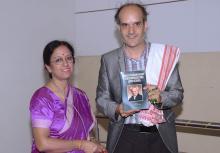The Sikkim Lok Sabha MP, Mr Prem Das Rai is an epitome of purposeful entry into politics with his remarkable commitment and idealist standing in public life. A highly educated man from the best of Institutions and with a background of having worked in Corporates, he is a man in a mission. Though he is serving his first term in the Lok Sabha, he exudes a veteran’s qualities with his sound understanding of his own State and the entire north east. Today he is amongst the few most promising leaders from the north east in Indias political horizon who has a clear roadmap for the future. We met him in a rainy morning in New Delhi. Some excerpts of our interview
Q: - Sikkim is least populated and second smallest after the Goa, how does it feel to represent the State in Central politics?
A: - We have only one Lok Sabha constituency so it is a big honour for me to represent 6.5 lakhs people since 2009. I have been trying to serve the people of Sikkim and entire north east at large in various capacities …so far, journey in public life has been quite satisfying.
Q: - You hold a unique distinction among the Parliamentarians. You are an alumni of the top institutions of the country like IIT/IIM. How did the idea for politics come while serving remarkably well in the corporate sector?
A: - Idea of politics was always in my mind as I came from a political family background. My father, C.D.Rai was in politics…so leaning for politics grew from the “table discussions” at home. Though later, father moved to government service facing some compelling financial reasons. In those days, politics used to be full with idealism where the dividend was restricted to satisfaction of serving people and that is what I have also learnt. My orientation towards politics grew further in School {Mussorie} and later in college. During that period, C.K.Lal {then Governor, Sikkim} encouraged and mentored me to join politics, which I did few years later.
Q: - You were at IIT Kanpur when Sikkim merged with India as its twenty-second State, did the end of Chogyal’s long rule come as shock for the indigenous communities? How different was and still is the perception of elites in this regard?
A: - It was indeed a shock and there was resistance but not something like a real fight. Protesters were unable to match with Indian forces, so transition happened fast. The elites were supportive to the independence, so this strategic move of Indira Gandhi succeeded well.
Q: - Among the States of north-east and even beyond, Sikkim presents a sort of hope for democracy…over the years, stable rule of your party {Sikkim Democratic Front, SDF}has kept enhancing the potential of Sikkim, will be you share with us, how SDF has been prioritizing the local issues?
A: - SDF came into power in 1994. It was a transition period…anti-India campaign and other adverse political issues were haunting this newly formed State. Until 1994, adverseness remained at place but when Pawan Kumar Chamling came in to power as Chief Minister, he articulated new democratic paradigms. Rest is history, today if you see Sikkim nobody has any existential problems. Freedom of Speech is prevailing…peoples are peace loving, so they enjoying their democratic rights in full spirits. Over the seventeen years of our rule, tremendous progresses have been made inside the State. By 2015, we will be the first Indian Organic State, and also a tourist hub…our sophisticated Human Resource, strong grassroot democracy and free press are in full tune and hence Sikkim has a lot of bright prospects.
Q: - Before coming into politics, you have worked with Bank of America and BASIX {in eastern zone} and have seen the ground level situation from close, which factors in your views are the impediments for complete exploration of the north east?
A: - I think impediments are essential…if you look on Sikkim, it becomes evident that the bottom level democracy has many grave complications. Autonomous aspirations are key and the other thing is that women’s representation is very feeble in local politics. This is where we need immediate attention from the government. Most essentially, we need to give better governance by ensuring accountability and people’s participation in the overall governance framework.
Q: - Our north eastern region gives us an edge over China and that leads to the fact that there there is a lot of irritation in China. China reacts on this from time to time by acknowledging Sikkim as an independent territory. Is this because China has some imperialistic motives or just because it’s difficult for them to digest that Tibet is closely connected through an Indian State?
A: - China’s issues are much larger-they want to strategically dominate over our eastern part to western part. They have game plans to secure their frontier to strengthen their stand in Tibet and western China. For China, Sikkim is a small tool to irritate the Indian authorities…Ministry of External Affairs {MEA} needs to think carefully on the whole issue. Dalai Lama has a huge following in Sikkim, we want 11th Karmapa {Ugen Trineley} back at the centre of learning which is sheet of governance/Rungtek Monastery. We have been repeatedly telling the government at Centre to help on this issue…till now, no substantial gain has achieved on this but we are trying our level best and hoping for some positive action in the future.
Q: - During the Chogyal’s rule, Sikkim shared a mixed relationship with Nepal but most of the time in hostility, Gurkha war {1814, Nepal vs Sikkim/British East India Company} fought and joint forces were defeated by Nepal, tension finally ended with the return of land by Nepal to Sikkim through Titalia Treaty {1817}, how historical factors are influencing India-Nepal co-operation in Sikkim?
A: - There is no real issue with the historical ties. More or less, it was balanced post Indian independence in 1947 with the Delhi treaty signed between Prime Minister Nehru and Nepal’s King Tribhuvan . Though many issues need relooking, henceforth India must rethink its policies on Nepal if they do not want interference by China in their backyard. As far the Titalia Treaty is concerned, it has nothing to do with the present India-Nepal relations. Legislatures of the both sides can work in streamlining the ties and taking forward the bilateral relations. Recently, a Nepali Parliamentary delegation has visited Delhi, we were happy to share our thought on the various issues. We warmly appreciate our historical relations with Nepal.
Q: - What’s the current state of Kalapani dispute over the Mahkali River water {Sarda River in India}? How do you think that the Sikkim government, along with the co-operation of Bihar government can think for reasserting the revision in contentious treaty of Sugauli {1819}?
A: - I think boundary issues are very contentious. It needs a thorough check up of the concerned matters. However, we should help Nepal in this phase of political transition…further; we are always ready for inter-state co-operation.
Q: - Do the current developments on ULFA give some long-lasting positive indications? Are you satisfied with the recent co-operation of Bangladesh?
A: - I think Bangladesh government is very co-operative at this time. We have to be in a comfortable relationship with our principal neighbours. Whatever we have gained from Bangladesh or Bhutan is an outcome of similar practices.
Q: - What’s the major boost up that Sikkim and the entire north east needs from Delhi? Despite have very reach human/natural resources, what keeping isolationism high in north east?
A: - I am looking at the developments happening in western/northern/southern part of India…only eastern parts are lagging behind. North east has a huge population with a lot of international boundaries, our stake is substantially higher in sharing the international border in comparison to the mainland part of India. It means we need to reach out to these countries and make the economies stronger. We need to have better facilities for trade, but first we need better connectivity with the mainland.
Q: - Are you satisfied with the implementation of Centre’s development programmes in the north east? Why the penetration of formal banking is so low in these terrains, isn’t the goal of financial inclusion seems a pipe dream?
A: - See, Centre sponsored schemes topped down without looking on the ground realities. We need to rethink on mechanism…NRHM/NREGA etc requires another policy intervention for their functional implementation! 12th Plan offers great opportunity on these issues…next five years will be very crucial for development. MFI’s are grappling with regulatory issues…massive problems happenings needs to be recouped, real losses must be stopped. Regulations need to be put up in place. MFI bill needs to be rational, in the winter session of Parliament; MFI’s Act may come into existence. Andhra Pradesh has created all mess, rest inner issues have to be solved by the MFI’s themselves. Yes, banking needs more penetration in north eastern States, the current state of affairs is not satisfactory at all.
Q: - How is the indigenous tribes of Sikkim responding on matters of national importance? Is modernism catching up these segments?
A: - Sikkim has high literacy rate, so modernism is the way for majority of its population. Except a few places, they are participating in the developmental programmes. Tourism is the big factor for this new resilience in the state.
Q: - What’s your view on Armed Force Special Power Act {AFSPA}?
A: - This is a draconian act and should be dropped immediately.
Q: - Will north east be a stronger hub of international trade?
A: - Certainly, but we have to adopt a flexible stand on the open border trade. Through better co-operation with Myanmar, India can smoothly carry forward its “Look east policy” in South East Asia.
Q: - On the losses caused by the earthquake? Was Sikkim prepared to deal with such natural disaster?
A: - Well the truth is the State government was not enough prepared to handle a natural disaster on this scale. We had a disaster management cell, there were a few meetings. But unfortunately, it was all on paper. There was no proper plan, no dissemination to villagers. Infact, most of the initial relief works was voluntary, that inspired others to do likewise or even more. After the earthquake, there has been silent resilience and actually volunteers are doing the real job here. That resilience comes from being struck for days without access to the world because it is landlocked. Land-sliding was quite rampant which forced peoples to remain inside with stocks of essential consumption. So, one of the major lessons of this tragedy is that we need more alertness and professional handling of disaster. That has been a area of grave concern. The airport near Gangtok is supposed to be ready in 2013. We need to recognise that there is a mountain paradigm, which must form the core of designing roads, buildings and other infrastructure; we also have to standardize these facilities, we build institutions in terms of research, design and building laws. Civil society will have to play a formidable part, but work should be handled in balance with those working on the sector of standards and specifications. This is a real wakeup call on respecting mountain ecology, on building networks and institutions which develop earthquake warning technology.
Atul Kumar Thakur
(Writer is a New Delhi based journalist, can be reached at Email:summertickets@gmail.com or www.onesstandpoint.blogspot.com )
.







Add new comment